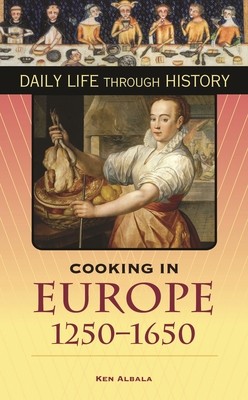
- We will send in 10–14 business days.
- Author: Ken Albala
- Publisher: Greenwood
- ISBN-10: 0313330964
- ISBN-13: 9780313330964
- Format: 17.8 x 26.3 x 1.8 cm, kieti viršeliai
- Language: English
- SAVE -10% with code: EXTRA
Reviews
Description
Ever get a yen for hemp seed soup, digestive pottage, carp fritters, jasper of milk, or frog pie? Would you like to test your culinary skills whipping up some edible counterfeit snow or nun's bozolati? Perhaps you have an assignment to make a typical Renaissance dish. The cookbook presents 171 unadulterated recipes from the Middle Ages, Renaissance, and Elizabethan eras. Most are translated from French, Italian, or Spanish into English for the first time. Some English recipes from the Elizabethan era are presented only in the original if they are close enough to modern English to present an easy exercise in translation. Expert commentary helps readers to be able to replicate the food as nearly as possible in their own kitchens.
An introduction overviews cuisine and food culture in these time periods and prepares the reader to replicate period food with advice on equipment, cooking methods, finding ingredients, and reading period recipes. The recipes are grouped by period and then type of food or course. Three lists of recipes-organized by how they appear in the book and by country and by special occasions-in the frontmatter help to quickly identify the type of dish desired. Some recipes will not appeal to modern tastes or sensibilities. This cookbook does not sanitize them for the modern palate. Most everything in this book is perfectly edible and, according to the author, noted food historian Ken Albala, delicious!
EXTRA 10 % discount with code: EXTRA
The promotion ends in 22d.13:31:44
The discount code is valid when purchasing from 10 €. Discounts do not stack.
- Author: Ken Albala
- Publisher: Greenwood
- ISBN-10: 0313330964
- ISBN-13: 9780313330964
- Format: 17.8 x 26.3 x 1.8 cm, kieti viršeliai
- Language: English English
Ever get a yen for hemp seed soup, digestive pottage, carp fritters, jasper of milk, or frog pie? Would you like to test your culinary skills whipping up some edible counterfeit snow or nun's bozolati? Perhaps you have an assignment to make a typical Renaissance dish. The cookbook presents 171 unadulterated recipes from the Middle Ages, Renaissance, and Elizabethan eras. Most are translated from French, Italian, or Spanish into English for the first time. Some English recipes from the Elizabethan era are presented only in the original if they are close enough to modern English to present an easy exercise in translation. Expert commentary helps readers to be able to replicate the food as nearly as possible in their own kitchens.
An introduction overviews cuisine and food culture in these time periods and prepares the reader to replicate period food with advice on equipment, cooking methods, finding ingredients, and reading period recipes. The recipes are grouped by period and then type of food or course. Three lists of recipes-organized by how they appear in the book and by country and by special occasions-in the frontmatter help to quickly identify the type of dish desired. Some recipes will not appeal to modern tastes or sensibilities. This cookbook does not sanitize them for the modern palate. Most everything in this book is perfectly edible and, according to the author, noted food historian Ken Albala, delicious!


Reviews